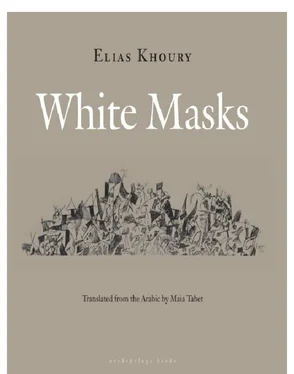When I’d said as much to Comrade Omar, back in the mountains, he’d told me that I was having a rough time. And looking fixedly at my good eye, he said, “You’re a war casualty, and your injury has undoubtedly affected your morale. Go back to Beirut and rest up, Comrade.” And so he sent me back here.
It’s not true I was having a rough time in the mountains. Only once did I say I wanted to give up and go home. It was long before that, and I didn’t leave. I just said it, and went and spent two days in my tent. But then I came out and resumed combat with the others. Why did he say I’d been through a lot and should return to Beirut? I’m just fine. .
All I did was that I wanted to know why they killed the boy. I begged Omar to spare him. I was really serious this time, but they executed him anyway. I didn’t even tell them his name. I’m the only person who spoke to him. . there was no reason to kill him.
They just shot him in cold blood, right there in front of me. He stared at me with eyes full of terror and reproach; I lowered my gaze, but I saw how they killed him.
I’d been the first one to spot him. He was lost in the mountains, with his rifle slung over his shoulder. He seemed to be searching for something and I just went up to him and grabbed him. He offered no resistance as I led him away.
“You alone?” I asked.
“Yes.”
“What are you doing here?”
“I lost my way.”
“Where are your people?”
“Over that way.”
“Come on. Walk ahead of me.”
We set off, him stumbling in front, with me behind, holding his rifle, and my comrades bringing up the rear. I noticed his knees were knocking.
“Please, leave him,” I told them. “I’ll carry out the interrogation.”
I took him into my tent and he told me about himself, in a trembling voice, over some hot tea. He said he was from Dowaar, that he had been raised by the monks in Bikfaya, and that he had lost his way.
“But why are you fighting?” I asked him.
“I fight just like everyone else.”
He was very young, with a pretty face. I told him not to be frightened.
“You’re going to shoot me!” he said.
“No, we won’t, don’t worry.”
“But you people kill.”
“No, we don’t. We don’t kill wantonly, like you. How many in your unit?”
“Five, we were on a reconnaissance patrol, and all of a sudden I found myself alone.”
“No. How many in the entire unit?”
“Oh, lots.”
“That is?”
“That is. . I, I don’t know. A large number.”
“A hundred?”
“More than a hundred. Perhaps… yes, more than a hundred.”
“Weaponry?”
“Same as yours.”
I hit him.
“You’d better talk,” I said, striking him on both cheeks. “This isn’t a joke.” He began to shake.
“I beg you,” he pleaded, “don’t kill me.”
“Weaponry?”
He added up their weapons for me, then added:
“Honestly, that’s all I know. I haven’t been to all our positions; I’m just an ordinary militiaman. Please don’t kill me.”
“We won’t, you don’t understand a thing. Are you hungry?”
“No. Thanks.”
I handed him a Marlboro, which he smoked greedily, in total silence. I heard Comrade Omar asking where the prisoner was. I stepped out of the tent and presented my report.
“That’s great, really great,” he said. “He spilled the beans quickly. Bring him out, I want to see him.”
I went back inside and asked the prisoner to follow me. “Here he is, Comrade Omar.”
“You scum, you fascist bastard, you savage!” And he started to strike him; then, moving in even closer: “You’re frightened. . real men aren’t frightened… a combatant doesn’t tremble like a child. . Stand up!”
The boy looked so desolate, I had wanted to go to him and reassure him, when I heard the gunshots. It was Omar, with his pistol; the boy keeled over into a sea of blood while the others fired machine guns and revolvers at the twitching body.
Once they had stopped, I went over to where he lay and turned him onto his back. Two glassy eyes stared back at me.
“Take him far away from here,” Omar said.
And they took him away.
“But why,” I asked him, “why did you do that? I promised we wouldn’t kill him.”
“You promised, huh! We did what we had to do.”
“But why? He was just an innocent, young boy! And he was our prisoner.”
“You don’t suppose that if they’d taken you prisoner you would have remained alive, do you?”
“But, even so. .”
“Do you think that if he’d captured you , he would have spared your life?”
“Still. .”
“Have you forgotten what they did to Saïd when they got him near the Nasra Tower in Ashrafiyyeh? How they roped him to a Land Rover and dragged him alive through the streets, as people gawked? Have you forgotten?”
“But I still. .”
“Have you forgotten how they hurled the children off the Nahr Beirut Bridge?”
“But even so. .”
“Even so, even so. . Just shut up will you. We have to kill them!”
“But we, too. .”
“But we, but they, but this, but that. . shut up philosophizing and get off my back!”
“Comrade Omar, I promised him, he was just a boy, without even the first signs of growth on his face. And he had nothing to do with the bridge or the Land Rover!”
“Cut it out, will you? By your logic, no one has anything to do with anything and everyone is innocent. What does it mean to have nothing to do with it? He knew what there was to know and was a fighter like the rest of them, and this is a war. We’re not playing games here, and nor are they. They kill us and we kill them.”
“But. .”
“But. . nothing.”
I went into my tent and didn’t come out for two days. I tried to forget the whole episode and to convince myself that Comrade Omar was right, that what he said was true and I was just being sentimental. And I managed to put it behind me; until the day I felt the maggots swarming over my arm.
It was dark, and we had left our dugout for more forward positions, engulfed in gunfire and shelling. As great flashes of light punctured the darkness, the very stars seemed to tremble in the sky. I was inching forward, on my belly and firing, when I suddenly collided into something. To begin with I couldn’t tell what it was. My arm had hit something taut, like inflated rubber, and then in an instant there were maggots everywhere, on my hand and up my arm. I drew back quickly, dropped my rifle, got onto my knees and started brushing my arm off frantically: from my forearm, the maggots had reached my waist, just above my cartridge belt. And then the smell exploded in my nostrils, and I froze. I was rooted to the spot, as if paralyzed. I considered retreating and returning to my tent, but I didn’t.
It was only the following morning — when the first sliver of light is still trimmed with darkness — that I saw him. It was the young boy, his body all bloated, with the first stages of decomposition already evident on his face, especially around the lips. I couldn’t help myself, I started howling. Immediately, the gunfire resumed. Still howling, I beat a retreat.
When I got back, I was raging.
“Why couldn’t you have buried him?” I screamed at Comrade Omar. I threw my rifle to the ground and went into my tent, cursing.
He followed me and said he thought I was no longer fit for combat and should return to Beirut. It wasn’t true, I was perfectly fit for combat — it was just that he couldn’t accept what I was saying. My request was simple enough: I was only asking for the boy to be buried. I didn’t see what the problem was — God alone knows how unbearable those maggots and that smell were!
Читать дальше












